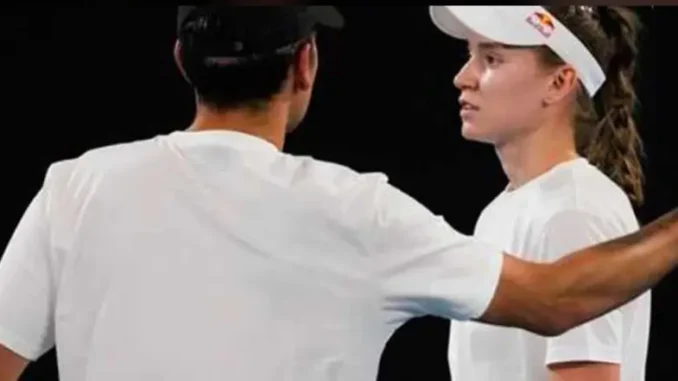
As Elena Rybakina powers through the 2025 French Open, her formidable presence on the clay courts of Roland Garros is matched by a swirling off-court controversy involving her long-time coach, Stefano Vukov. The 2022 Wimbledon champion, fresh off a commanding 6-2, 6-2 victory over American teenager Iva Jovic to reach the third round, has been forced to address questions about her ongoing professional relationship with Vukov, who is serving a one-year WTA suspension for breaching the organization’s code of conduct. Despite the ban, which bars Vukov from obtaining official credentials or accessing WTA facilities, Rybakina remains steadfast in her collaboration with the Croatian coach, offering a candid explanation of how they navigate the restrictions. “We usually train together between tournaments, not when the tournament is ongoing,” Rybakina said after her match, her tone resolute yet measured. “It’s been the same routine, just without him being physically present here.”
The saga surrounding Rybakina and Vukov has gripped the tennis world, fueled by allegations of mental abuse and a toxic dynamic that prompted the WTA’s investigation. The inquiry, concluded in February 2025, revealed disturbing details, including claims that Vukov called Rybakina “stupid” and told her she’d be “picking potatoes in Russia” without him. Reports also surfaced of Vukov bombarding Rybakina with over 100 calls and texts after their initial split in August 2024, prompting her team to request security at her New York hotel during the US Open. A letter from WTA CEO Portia Archer described their relationship as one of dependence, with Rybakina’s mother reportedly pleading with Vukov not to make her daughter cry. Despite these allegations, Rybakina has consistently defended Vukov, insisting he “never abused” her. “I’m not happy with the comments I see, especially from the people who are on the tour,” she said earlier this year in Dubai, expressing frustration at the lack of support from peers. “No one offered any support. Honestly, I don’t need it.”
Rybakina’s decision to reinstate Vukov in 2025, after a brief stint with Novak Djokovic’s former coach Goran Ivanisevic, stunned the tennis community. Ivanisevic, blindsided by the reunion, parted ways with Rybakina after her Australian Open fourth-round loss to Madison Keys. “Things happened off the court that I couldn’t control,” Ivanisevic said, alluding to Vukov’s lingering influence. Rybakina, now working with Italian coach Davide Sanguinetti, has maintained contact with Vukov, training with him at private facilities between tournaments. “We’ve always worked this way,” she reiterated, emphasizing that their routine remains unchanged despite the ban. This arrangement has sparked concern among fans and pundits, with former WTA star Andrea Petkovic questioning Rybakina’s decision-making, and Barbara Schett accusing Vukov of “brainwashing” the Kazakh star.
On the court, Rybakina’s form is undeniable. Her Strasbourg Open title last week, where she defeated Ludmilla Samsonova 6-1, 6-7(2), 6-1, marked her first trophy in 13 months and extended her winning streak to six matches. “Thank you to my fitness coach, physio, Stefano, and to my family,” she said in her victory speech, a nod to Vukov that drew polarized reactions. Her French Open campaign began with a 6-3, 6-4 win over Julia Riera, followed by the Jovic rout, setting up a third-round clash with 2017 champion Jelena Ostapenko. Rybakina’s powerful serve—she fired an ace to close out Strasbourg—and aggressive baseline game make her a formidable contender, despite a 2024 season plagued by injuries, including bronchitis and a back issue.
The controversy has not gone unnoticed. Serena Williams’ former coach Rennae Stubbs revealed Vukov threatened legal action against her for criticizing his “very negative” coaching style, a stance she doubled down on after the WTA’s findings. “He came after me for saying things that were true,” Stubbs said on her podcast. Meanwhile, Rybakina’s isolation on tour, exacerbated by the competitive nature of the WTA, has left her feeling unsupported. “Everybody’s surrounded by their teams,” she said in Dubai, dismissing the idea of close friendships among rivals. As she prepares for Ostapenko, Rybakina’s focus remains on her game, but the shadow of Vukov’s ban looms large, raising questions about her future and the WTA’s role in protecting its players.
Leave a Reply